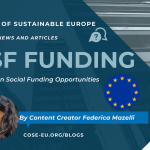Written by: Federica Mazelli
Reading time: 7 minutes
Eu fundings -Programme for Environment and Climate Action (LIFE)
The European Union provides fundings for different projects and programmes to gather, collaborate and impact using certain rules that are applied over fundings to help monitor how funds are used, invested, and employed, in so that funds are spent responsibly and transparently.
The European fundings come in different forms: guarantees, equity and loans (forms of financial assistance created to support EU policies and programs), grants (partly funded by the EU and partly from other sources), prizes to winners of Horizon 2020 contests and finally subsidies (managed by national and regional authorities).
These fundings can be handled directly, indirectly, or shared by its management. Direct management means that they are ordinarily managed according to European policies in form of grants for specific projects. Indirect management does not involve directly the EU, however, the management of the funds is entrusted to national and regional authorities. In conclusion, shared management relies on a system in which fundings are operated in partnership with national and regional authorities, accounting for around 80% of the EU budget.
There are five mains funds used, under the umbrella of the European structural & investment funds:
- European Regional Development Fund;
- European Social Fund;
- Cohesion Fund;
- European Agricultural Fund for Rural Development ;
- European Maritime and Fisheries Fund;
Moreover, different kinds of beneficiaries can get European fundings which includes researchers, academia, and initiatives, each fundings program supports research and innovation (R&D) projects. Environment and climate action (LIFE) is one of those programs.
Environment and climate action (LIFE)
The LIFE program is the EU’s financing instrument for the environment and climate activity. It has been running since 1992 and has co-financed more than 5,500 projects over the EU and nations exterior the EU.
The program for the environment and climate activity (LIFE) EU program is solely committed to the environment, nature preservation, and climate activity, all of which are zones of developing concern for citizens. It accounts for a wide assortment of exercises, extending from the security of biodiversity to bolster for the circular economy; from the demonstration of unexploited emission-reduction advances to preliminary work for universal transactions; and from the enforcement of environment and climate enactment to the improvement of the environment and climate administration at all levels.
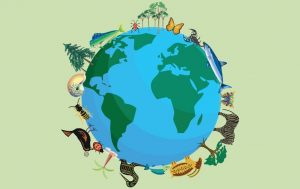
For the environment and climate action.
The project aims to contribute to a greener and more resource-efficient economy, the advancement and execution of the EU natural approach support superior natural administration and data at all levels. Diminish EU greenhouse gas emissions and create and execute EU climate arrangements. Finally, increment the EU’s versatility to climate alter (the ‘’climate change adaptation” need area).
The LIFE program is considered vital since it contributes to guaranteeing the application of EU natural and climate enactment and approaches over the EU. It, too, energizes cross-border reactions to common challenges which individual Member States acting alone would be incapable to address, enabling superior sharing of obligation for the assurance of characteristic assets and advancement of solidarity for the administration and preservation of environmental assets within the EU.
A budget of 5.424.2 million has been earmarked for the 2021-2027 program period, an increase of 60% compared to the previous period (the funds are managed directly and indirectly).
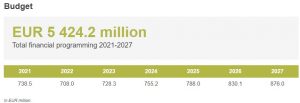
Total funding plan 2021-2027
The predecessor program (2014-2020) had a budget allocation of 3 466.4 million.
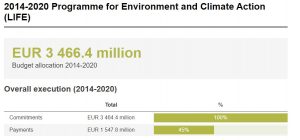
Total budget allocated till 2020
Thanks to the LIFE program, between 2014 and 2020 several goals have been achieved:
- 247 wildlife species are being tended to by 108 LIFE projects, through particular activities pointed at progressing their conditions.
- 1.7 million hectares in which 110 LIFE projects are enhancing the preservation status of natural and semi-natural habitats.
- 10 million tonnes per year of decrease in greenhouse gasses emanations is being focused on by 173 LIFE projects.
- 25 000 tonnes per year of squander is being repurposed within the system of 139 LIFE projects pointed at moving forward waste management.
- 1.6 million people have already profited from a diminishment in discuss outflows (i.e. cleaner discuss) much obliged to 14 wrapped up LIFE ventures.
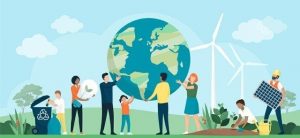
SUB-Programmes of LIFE
LIFE has four new sub-programmes:
-
- Nature and Biodiversity (will aim at the restoration and protection of Europe’s nature and reversing and halting biodiversity loss);
- Circular Economy and Quality of Life (aims at facilitating the transition toward an energy-efficient, sustainable, and climate-resilient economy and at improving, and protecting the quality of the environment);
- Climate Change Mitigation and Adaptation (will contribute to the shift towards an energy-efficient, sustainable, renewable energy-based, resilient economy, and climate-neutral, thereby contributing to sustainable development);
- Clean Energy Transition (it continues to support the delivery of EU policies in the field of sustainable energy, as, the European Green Deal).
The projects are confirmed nowadays and the four sub-programs will begin reviewing and accepting proposals for financing from 2022.
Countries in Europe are now taking actions
A major transnational venture will reestablish corrupted peatlands in Belgium, Ireland, Germany, Poland, and the Netherlands. Activities expected to incorporate and reestablish the carbon sink work of peatlands, contributing to the EU’s aspiration to be climate-neutral by 2050.
The extend will too raise groundwater levels and offer assistance preserve species and living spaces secured beneath the EU Birds and Habitat Directives.
Another project will see Italian chefs advancing climate-smart, nutritious and reasonable diets, lessening nourishment waste through awareness-raising, communication, and instruction campaigns, focusing on staff, clients and others.
A Polish project will illustrate the possibility of utilizing renewable vitality for cooling open buildings. In conclusion, a project from France will set up an inventive framework to upgrade asset utilize and recuperate squander from neighborhood development and open works.

The Importance of a LIFE-Programme
Since climate change is a real issue nowadays, all the European Union Member States need to commit and take concrete actions to promote a better green future for the present and the next generations. Let’s do it together!

Content Creator and Partner-event manager
“Federica is passionate about gender equality, human rights and social issues. During her studies in political sciences, international relations at the University of Bologna, Federica worked in the largest youth-run organization with the aim of developing the leadership of young people, through practical experiences in challenging environments. In her organizational role, she contributes to social issues, in particular to the achievement of the UN Sustainable Development Goals, with a positive impact on youth entrepreneurship. With her work, Federica wants to bring her generation closer to world issues and make them part of active change giving them a call to action.”
References:

